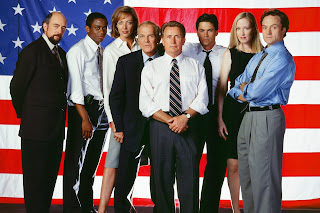And on my fantasy island, Jed Bartlet is President. And not only is he intelligent and kind, but he is surrounded by a group of advisors who work incredibly hard to run the government for the betterment of the people of the United States.
The West Wing is pretty close to television perfection. “Is.” Present tense. For two reasons: because the show is more than just extraordinary for its’ time but also because streaming services ensure that nothing exists in the past the way it used to. Aaron Sorkin’s masterpiece is brilliantly acted, exquisitely written and is just as relevant today as when it debuted thirty years ago.
Martin Sheen leads the incredible cast. Sheen imbues the role of President Bartlet with every quality one could want in a leader: passionate, fair, incredibly intelligent and yet still willing to admit he cannot possibly know everything. Around Bartlet circles his senior staff, played throughout the series by Allison Janney, Bradley Whitford, Richard Schiff, John Spencer, Dule Hill, Rob Lowe and Joshua Malina. Every single one of the actors absolutely transforms into their characters. Janney stands out. Her portrayal of Press Secretary CJ Cregg is a showcase for her ability to balance and pull off a delicate mix of drama and humor, even physical comedy. But Sheen and John Spencer, as Chief of Staff Leo McGarry, are the tent poles of The West Wing. Their leadership and the respect they garner from everyone around them is very apparently not just the case on screen.
As a devoted fan of The American President, I was already well acquainted with Sorkin’s skill in the fictional political arena. The West Wing's dialogue is incredibly smart. To the point that, from time to time, a dictionary is a necessary viewing companion. The characters speak at a rapid-fire pace, illustrating the fact that they know there is so much to do and so little time in which to do it. Along those same lines, Sorkin made famous the ‘walk and talk’ in which characters hold their conversations on the go, you know, like in real life. The brilliance in the writing is not just the dialogue, it is also the construction and execution of the storylines and the contrasts present in every episode. There are good days and bad. Some days you’re up and your coworker is down, sometimes the opposite. And more often that not everything can, and does, change on a dime. Sorkin did not pen every episode and praise is, of course, due to the slate of writers for the show. The writers did an incredible job illustrating how challenging the act of governing is, and how many devoted, hard-working people that requires. At least in normal times.
Which leads me to relevance. In some ways, the relevancy of The West Wing is heart-breaking. Systemic racism, gay rights, Roe v. Wade, unrest in the Middle East, these stories could just as easily be from today’s headlines rather than those of thirty years ago. With one incredibly key difference: during the Bartlet administration there are thousands of intelligent people working to make this fantasy island a better place to live. Cut to, real world. The incoherence in the current administration qualifies for the moniker ‘stranger than fiction’ better than any storyline a team of writers could ever come up with. And I realize it may not be entirely fair to compare a fictional administration to a real one, but with White House staffers advising for The West Wing, the portrayal of the goings on in the Bartlet administration is as a close a glimpse the public will get to the day to day struggle involved in running the United States government. Without a doubt, this fictional band of civil servants is whom I choose to think are running the country. Let us hope beyond hope that by this time next week my fantasy island bears a closer resemblance to our reality.

No comments:
Post a Comment